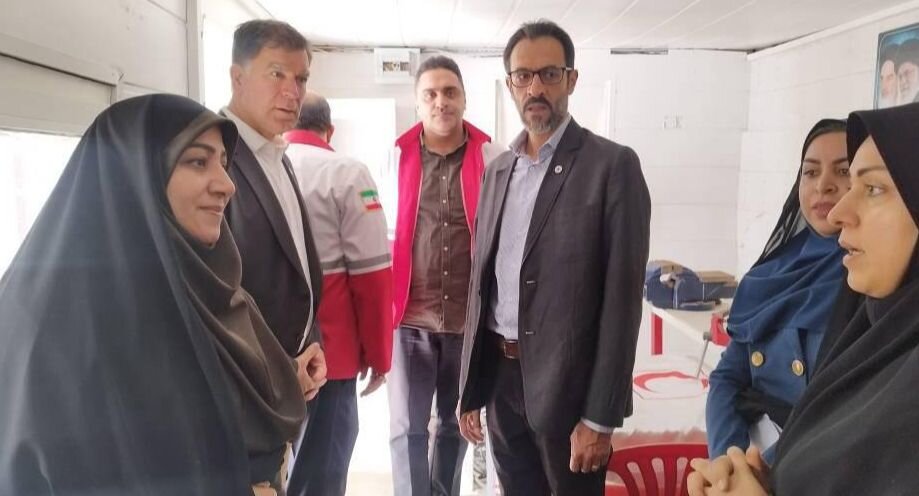IRCS, ICRC enhance ties to promote rehabilitation services

TEHRAN –The Iranian Red Crescent Society (IRCS) and the International Committee of the Red Cross (ICRC) have discussed ways to enhance rehabilitation services for vulnerable and disabled individuals in Zahedan, the capital of Sistan-Baluchestan.
During a meeting on Thursday, Razieh Alishvandi, the IRCS director for international affairs, and Vincent Cassard, representatives of the ICRC in Iran, visited the rehabilitation center in Zahedan, the IRCS website reported.
Visiting the center, Alishvandi reviewed the joint rehabilitation project which in collaboration with the ICRC aims at providing physical rehabilitation services to migrants in need as well as vulnerable citizens in the cities of Zahedan, Iranshahr, Chabahar, and Zabol in Sistan-Baluchestan province.
Based on the agreement, physical rehabilitation services have been provided in Sistan-Baluchestan province since the Iranian year 1398 (2018-2019).
“Currently, the Iranian Red Crescent Society operates rehabilitation centers in all 31 provinces; they offer a wide range of services to individuals with physical disabilities as part of its program,” Alishvandi stated.
The ICRC funds physical rehabilitation programs for vulnerable and disabled individuals, both Iranians and Afghans in Sistan-Baluchestan province.
The support covers the costs of various services and supportive devices such as prostheses, orthotics, physiotherapy, special shoes, wheelchairs, canes, and walking aids.
The logistics department of ICRC purchases needed items either from Sistan-Baluchestan (in case available) or Tehran provinces.
Ongoing training sessions and on-the-job support are provided during field visits to orthotists and prosthetists throughout the manufacturing process.
Moreover, the ICRC allocates a budget to cover the costs of the project, including human resources, building rent, and equipment required for conducting screening assessments.
In 2022, the Physical Demand Analysis (PDA) Institute, encompassing social workers and physiotherapists, evaluated the needs in three remote areas of Sistan-Baluchistan province namely Zabol, Iranshahr, and Chabahar.
Out of 490 potential service users initially identified, some 300 met the inclusion criteria.
Then the FDA team set up relief clinics in Zabol and Iranshahr to provide services to the identified disabled people. Chabahar clinic also started operating in 2024.
Supporting Afghan refugees
The IRCS and the ICRC in Iran are conducting joint programs to address the challenges facing Afghan refugees and vulnerable Iranians residing in Golshahr district in Mashhad, northeastern Khorasan Razavi province.
"The initiative to provide primary health and rehabilitation services to Afghan immigrants and residents of Golshahr district is part of the joint program," IRNA quoted Alishvandi as saying in May.
Based on the memorandum of understanding (MOU) that was signed in the Iranian calendar year 1392 (2013 –2014), IRCS and ICRC agreed to support the rehabilitated refugees.
The program aims to provide basic health, mental health, educational, and social services. It also focuses on providing preventive and social assistance and reducing social harm to the target population, she added.
Physically disabled people will benefit from rehabilitation services and mobility aids including orthotics and prostheses, wheelchairs, walkers, and sticks, Alishvandi noted.
They will also enjoy relevant physical therapy services such as physiotherapy or occupational therapy based on the committee's definitions.
The service recipients will be identified by the Society for Recovery and Support to be approved by the representative of the ICRC and then referred to the IRCS to receive these services.
The project is being implemented in four provinces on the eastern border of the country after the arrival of Afghan immigrants who left their countries because of the new governance in Afghanistan.
Funded by ICRC, the necessary preparations have been made to equip the IRCS rehabilitation centers in Mashhad which offer services to a large number of residents and Afghan nationals.
Health services to vulnerable immigrants
In December 2023, Alishvandi and Cassard paid a visit to the Golshahr project site, the IRCS website reported.
The project focused on the provision of health services to pregnant women, and people who are suffering from diabetes, high blood pressure, asthma, mental health disorders, and physical disorders, Alishvandi said.
“The Society for Recovery and Support provides an opportunity for Afghan women who need psychological support to share and solve their problems.”
Launching home businesses and vocational training centers, empowering for creating jobs, earning money, educating, and raising children were among the other programs of the IRCS in this regard.
It is worth noting that the IRCS health project is carried out by physicians, nurses, social workers, and dieticians. The health project includes medical consultations, physical rehabilitation, referrals to laboratories and radiology centers, dental centers, and specialists.
It also provides support for purchasing medication, receiving psychological and psychiatric consultations, nutrition, and holding health awareness-raising sessions with the help of nurses and dieticians.
MT/MG
